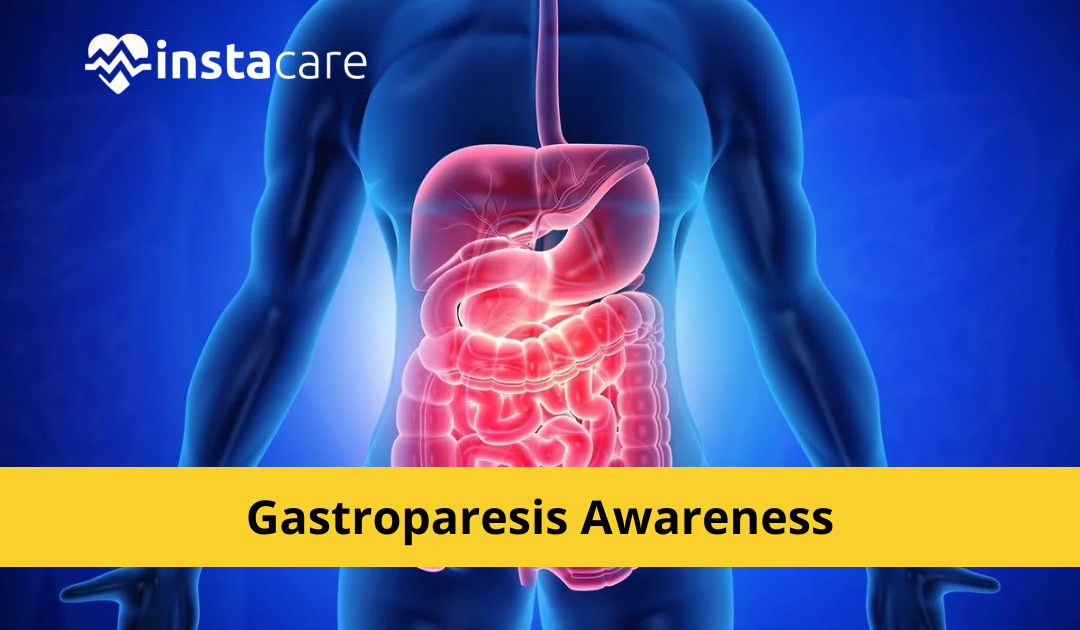Gastroparesis, also known as delayed gastric emptying, is a condition in which the stomach empties its contents too slowly. When the vagus nerve is compromised and the muscles of the stomach and intestines are not functioning correctly, then gastroparesis results. Following that, food passes through the digestive system slowly or not at all. Diabetes is the most frequent cause of gastroparesis because it damages the vagus nerve when blood sugar levels are high. However, many patients have what is known as idiopathic gastroparesis, for which there is no recognized reason and which remains undiagnosed after several medical testing.
Symptoms Of Gastroparesis
Symptoms of gastroparesis include:
- Upper abdominal pain
- Nausea/vomiting
- Reflux
- Abdominal bloating
- Fatigue
- Not feeling hungry/early satiety
- Constipation
- Diarrhea
- Abdominal spasms
- Erratic blood glucose levels
- Weight loss
- Weight gain
Causes Of Gastroparesis
Injuries to the nerves, especially damage to the vagus nerve, can result in gastroparesis. The vagus nerve typically causes your stomach muscles to contract (tighten) to aid in the passage of food through your digestive system. Your vagus nerve is harmed by diabetes in situations of gastroparesis. As a result, food cannot pass from your stomach to your intestines because your stomach and intestine muscles cannot function correctly.
View More: August is Digestive Tract Paralysis Awareness Month
Other causes include:
- Viral illnesses
- Having abdominal (gastric) surgery after suffering vagus nerve damage
- Drugs including certain antidepressants and opioids
- Scleroderma with amyloidosis (protein deposits in tissues and organs) (a connective tissue disorder that affects your skin, blood vessels, skeletal muscles, and internal organs).
Complications Of Gastroparesis
Multiple issues can result from gastroparesis:
- Food that spends too much time in the stomach can ferment, promoting germs' development.
- Food in your stomach has the potential to solidify into a mass known as a bezoar. Bezoars can lead to stomach obstructions that prevent food from entering your small intestine.
- Because blood glucose levels swiftly increase when the food finally exits your stomach and enters your small intestine, those with diabetes and gastroparesis may also experience additional issues.
- Dehydration (extreme thirst)
- Malnutrition (poor nutrition)
Things That Can Change How You Feel Every Day
Once you find a treatment strategy that works for you, gastroparesis may occasionally "hibernate," providing you with relief from most symptoms. Remission is the term for this. However, even if you follow a rigorous gastroparesis diet and take your medicine as directed, you still risk a flare-up. There are a lot of things that can change how you feel every day:
- Menstrual cycle
- Stress
- Travel
- Additional ailments
- Modifications to activity levels
- Modifications to sleep habits
- Unsound nutrition
- Amendments to supplements or meds
Gastroparesis Surgery
Surgery may be helpful for gastroparesis patients who have nausea and vomiting despite taking medication. Gastric electrical stimulation, a procedure that gives your stomach muscles brief electric shocks, is one kind of surgery for gastroparesis. During this treatment, your doctor places a tiny gadget called a gastric stimulator within your stomach. Two leads on the stimulator are connected to your stomach and deliver gentle electric shocks to prevent vomiting. Your provider can change how powerful the electric shocks are. A battery powering the gadget can last up to 10 years.
The procedure known as gastric bypass involves cutting a tiny pouch from the top of your stomach to ease the symptoms of gastroparesis. The bottom half of the small intestine is joined directly to the little stomach pouch after being divided in half. This restricts how much food you can consume. For a person with obesity and diabetes, this procedure is more efficient than either medicine or a gastric stimulator.
Conclusion
Gastroparesis is a challenging condition to treat. Your ability to manage this issue will improve the more knowledgeable you are about it.
Please book an appointment with the Best Gastroenterologist in Lahore, Karachi, Islamabad, and all major cities of Pakistan through InstaCare, or call our helpline at 03100002273 to find the verified doctor for your disease.
Source: https://instacare.pk/blog/gastroparesis-symptoms-causes-complications-and-diagnosis












